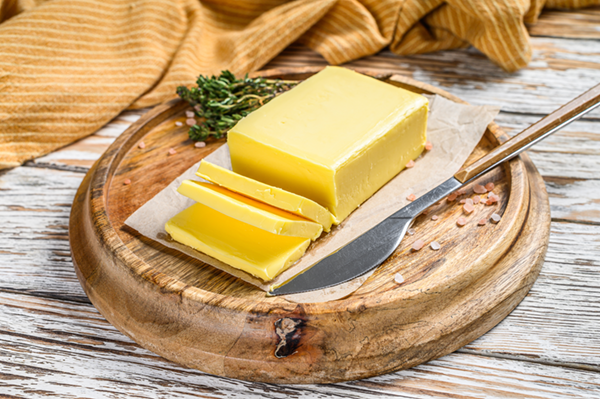What Is Margarine? Today, the word is often used as a common name for a butter substitute. You can find margarine alongside butter in your local grocery store. We are going to look at the health impacts of margarine, its history as well as what exactly it is made from.
History of Butter Substitute
During the reign of Louis III in France, he offered a prize to anyone who could create a butter substitute. He was looking for a substitute that would help feed the poor and enlisted men. In response to the prize offer, a French chemist named Hippolyte Mège-Mouriés created oleomargarine. Since then, the name has been shortened to margarine.

What Is Margarine?
Margarine is the generic term for a direct butter substitute. Like butter, many people use it as a spread or flavoring. It is also used as a direct proportional substitute for butter in any baking or cooking recipe.
Primary Ingredients
A butter substitute is created from hydrogenated vegetable oils, including canola, corn and sunflower oil. To make it look more like butter, milk, cream, food coloring and preservatives, along with other additives are often added to the mixture.
It has often been promoted as a healthy alternative to butter because it is a non-dairy, no cholesterol alternative. It may however, pose a concern to your health because of the hydrogenation process.
Health Impacts
If it contains no cholesterol, shouldn’t it be good for you to eat? I remember hearing arguments over the years, saying that margarine is better for you than butter. Then, it seemed like it was no more than five years later, maybe even less, the tides changed, and butter was better for you than margarine. What is true?
Through the normal creation process, regular margarine contains 80% fat. The fat free version is made up of gelatin, rice starch, lactose, emulsifiers and a lot of water. There are also other margarine and butter blends that mix the two together to varying degrees. Which one is better for you? It all depends on what aspect you are looking at. If you are trying to lower your cholesterol, then a butter substitute is probably better for you. But if not, butter might be the best option, since it is more natural and you will not have to worry about unnecessary chemical intake.
What Can It Be Used For
Margarine is the exact equivalent to butter. Therefore, whatever you enjoy having butter on, you can also use margarine. The nice thing about the soft tub of margarine is that it is easy to spread, while butter has to become room temperature before it is easy to smooth. You can eat it on toast, rolls, potatoes, in place of butter when you are cooking or baking.
Margarine is a general name for butter substitutes. You can find it in many different forms and combinations at your local grocery store. In short, this butter substitute is created from hydrogenated vegetable oils and then goes through a process to become more like butter.
What do your prefer, butter or margarine? Why?
Learn all about the delicious hot sauce, Sambal, in What Is Sambal? You might also enjoy learning What Are The Pros And Cons Of Farmed Fish? Check it out today!

hello , thanks for this article , i just want to ask you , is it ok to share this article on my facebook page ?
Hi Gale,
Yes, you may share this on your personal Facebook page by clicking on the Facebook icon on the left-hand side, or directly under the title of this page. 🙂 Thank you for your interest!